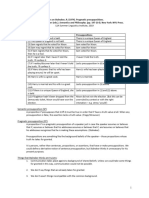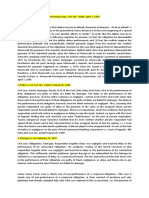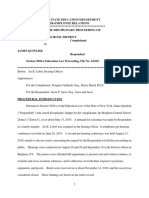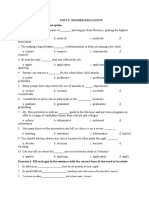0 ratings0% found this document useful (0 votes)
84 viewsFallacies As Reasoning Errors Fallacies of Faulty Authority Fallacies of Cause and Effect Fallacies of Irrelevance
Fallacies As Reasoning Errors Fallacies of Faulty Authority Fallacies of Cause and Effect Fallacies of Irrelevance
Uploaded by
RegieReyAgustinThis document discusses various types of logical fallacies that can occur in reasoning and arguments. It categorizes fallacies into four groups: fallacies of faulty reasoning, fallacies of authority, fallacies of cause and effect, and fallacies of irrelevance. Each category contains several specific fallacies such as circular argument, appeal to authority, cause and effect reasoning, ad hominem, slippery slope, and straw man. The document provides definitions and examples for each fallacy type.
Copyright:
© All Rights Reserved
Available Formats
Download as DOC, PDF, TXT or read online from Scribd
Fallacies As Reasoning Errors Fallacies of Faulty Authority Fallacies of Cause and Effect Fallacies of Irrelevance
Fallacies As Reasoning Errors Fallacies of Faulty Authority Fallacies of Cause and Effect Fallacies of Irrelevance
Uploaded by
RegieReyAgustin0 ratings0% found this document useful (0 votes)
84 views3 pagesThis document discusses various types of logical fallacies that can occur in reasoning and arguments. It categorizes fallacies into four groups: fallacies of faulty reasoning, fallacies of authority, fallacies of cause and effect, and fallacies of irrelevance. Each category contains several specific fallacies such as circular argument, appeal to authority, cause and effect reasoning, ad hominem, slippery slope, and straw man. The document provides definitions and examples for each fallacy type.
Original Description:
Table of Fallacies (Logic)
Original Title
Table of Fallacies
Copyright
© © All Rights Reserved
Available Formats
DOC, PDF, TXT or read online from Scribd
Share this document
Did you find this document useful?
Is this content inappropriate?
This document discusses various types of logical fallacies that can occur in reasoning and arguments. It categorizes fallacies into four groups: fallacies of faulty reasoning, fallacies of authority, fallacies of cause and effect, and fallacies of irrelevance. Each category contains several specific fallacies such as circular argument, appeal to authority, cause and effect reasoning, ad hominem, slippery slope, and straw man. The document provides definitions and examples for each fallacy type.
Copyright:
© All Rights Reserved
Available Formats
Download as DOC, PDF, TXT or read online from Scribd
Download as doc, pdf, or txt
0 ratings0% found this document useful (0 votes)
84 views3 pagesFallacies As Reasoning Errors Fallacies of Faulty Authority Fallacies of Cause and Effect Fallacies of Irrelevance
Fallacies As Reasoning Errors Fallacies of Faulty Authority Fallacies of Cause and Effect Fallacies of Irrelevance
Uploaded by
RegieReyAgustinThis document discusses various types of logical fallacies that can occur in reasoning and arguments. It categorizes fallacies into four groups: fallacies of faulty reasoning, fallacies of authority, fallacies of cause and effect, and fallacies of irrelevance. Each category contains several specific fallacies such as circular argument, appeal to authority, cause and effect reasoning, ad hominem, slippery slope, and straw man. The document provides definitions and examples for each fallacy type.
Copyright:
© All Rights Reserved
Available Formats
Download as DOC, PDF, TXT or read online from Scribd
Download as doc, pdf, or txt
You are on page 1of 3
REGIE REY N.
AGUSTIN LEGAL TECHNIQUE AND LOGIC
JD-1 ATTY. LEO MALAGAR
FALLACIES AS FALLACIES OF FAULTY FALLACIES OF CAUSE FALLACIES OF
REASONING ERRORS AUTHORITY AND EFFECT IRRELEVANCE
Appeal to Authority Cause and Effect Ad Hominem
Circular Argument
Reasoning
- It is the premise and the Requisites: - it does not mean that - attacking the arguer
conclusions are the same a) Actual physical Presence we can assert with any instead of attacking
proposition. of purported authority; certainty that one caused the argument.
(ex. My name is Steve b) Cited authority is in fact the other when simply
because my name is an expert; and we can find two things (ex. Don’t listen to
Steve.) c) Expert must be objective occurring together. him. He can’t even
or disinterested. speak proper
English, so you
know his argument
is also non-sense.)
Begging the Question Appeal to Common Post Hoc Fallacy Attacking a Straw
Opinion Man
- arguing unfairly in a way - simply because something - just because it comes - metaphor for
that tries to use the is a common belief, that is after, it does not mean arguments that do
conclusion in support of not sufficient for rational that it happened because not deal with the
itself. belief. of it. actual argument
- a question that is not - prior difference might be made but rather a
fairly asked to elicit an completely unrelated to weaker, easier-to-
honest response from the the posterior difference. refute version.
listener, but rather a
sentence that looks like a Kinds:
question but is designed (1) Altering the scope of
to lead the listener to a the premises offered
particular desired
response. (2) Interlocutor replaces all
of the premises wholesale
(“the real reason”)
Equivocation (ambiguity) Appeal to Tradition Neglect of a Common Red Herring
Cause
- changing the meaning of a - just because it has always - correlation does not - changing the topic
word in the middle of an been believed or always necessarily mean or conclusion of the
argument. been done a certain way causation. conversation.
(ex. *Tables are furnitures. does not make that belief or (ex. just because (ex. You really
* My statistics book has that method justified. whenever we see A, we need to clean those
tables in it. also see B does not mean dishes in the sink.
* Therefore, there is that A causes B or that B You make yourself
furniture in my statistics cause A; there might be a a snack and just
book.) third thing, C, that cause clutter the kitchen
both A and B.) and leave it for me.)
Distinction Without a Fallacy of Novelty Causal Tu Quoque
Difference Oversimplification
- drawing of distinction - just because something is - convergence of a - informal
between two things that the latest does not multiplicity of factors. logical fallacy that
are not, in fact, distinct. necessarily make it the - . intends to discredit
(ex. I didn’t steal it; I just greatest. (ex. The reason drug use the opponent's
didn’t ask before I (ex. is down is because they argument by
borrowed it.) advertisement/commercial) have been showing those asserting the
“just say no” opponent's failure
commercials on to act consistently
television. The message in accordance with
must really be getting its conclusion
through to people.)
Arguing by Analogy Confusion of a
necessary with a
sufficient condition
- employing a flawed - taking a sufficient
analogy in an argument, condition and wrongly
where the system and the assert it to be necessary.
analogue are not alike in (ex. A is necessary for B
the ways used to draw the if you cannot have B
inference. without first having had
(ex. She must wear A. In other words, A is
dentures. He said that her necessary for B if A is
teeth were like the stars, required for even the
and we know that the stars possibility of B. A
come out at night.) doesn’t bring about B by
itself, but if there is no
A , there is no B.)
Slippery Slope Fallacy
- one asserts the existence
of such a chain without
giving full causal
arguments for each step
in the chain.
You might also like
- Faulty LogicDocument6 pagesFaulty LogicMel Joyce Rumay100% (4)
- The Jennifer Laude CaseDocument6 pagesThe Jennifer Laude CaseRegieReyAgustinNo ratings yet
- Mathematics MYP 2 - Unit PlannersDocument42 pagesMathematics MYP 2 - Unit Plannershemendu nandanNo ratings yet
- Fallacies Activity and WorksheetDocument2 pagesFallacies Activity and WorksheetYumi NabanaNo ratings yet
- BiologyDocument2 pagesBiologyJamshed AltafNo ratings yet
- Kolcaba Theory of ComfortDocument3 pagesKolcaba Theory of Comfortapi-3014427910% (1)
- The Role of Quality Strategic Planning On Organisational SuccessDocument12 pagesThe Role of Quality Strategic Planning On Organisational SuccessHasim kunNo ratings yet
- Effective Listening and NoteDocument33 pagesEffective Listening and NoteIbrahim GhazalNo ratings yet
- Virtue, Personality, and Social Relations: Self-Control As The Moral MuscleDocument30 pagesVirtue, Personality, and Social Relations: Self-Control As The Moral MuscleAlexMouraNo ratings yet
- A How-To Guide On FOILDocument4 pagesA How-To Guide On FOILBronx ProfessoraNo ratings yet
- 2004.06.human - Origins Willima DembskiDocument26 pages2004.06.human - Origins Willima DembskiLeft Hook OlekNo ratings yet
- Consumer Behaviour ExercisesDocument2 pagesConsumer Behaviour ExercisesVignesh ParthasarathyNo ratings yet
- 00 A4 7 Luo (Dholuo) Phrases and BasicsDocument7 pages00 A4 7 Luo (Dholuo) Phrases and BasicsGkou DojkuNo ratings yet
- Classification of Fallacies: Gabrielle Ann F. Seguiran LAW1715710Document2 pagesClassification of Fallacies: Gabrielle Ann F. Seguiran LAW1715710gabbieseguiranNo ratings yet
- Synthesis Essay Assignment: OptionsDocument8 pagesSynthesis Essay Assignment: Optionsapi-600572498No ratings yet
- Module 2.2Document43 pagesModule 2.2Joseph BertisNo ratings yet
- 3 LogicDocument18 pages3 LogicYek Xiao NingNo ratings yet
- Philo 2Q ReviewerDocument4 pagesPhilo 2Q Reviewerjohn.kerry.sanglay22No ratings yet
- Elements of Argument: Brief OverviewDocument8 pagesElements of Argument: Brief Overviewbonnie lenore kyburzNo ratings yet
- University of Illinois Press North American Philosophical PublicationsDocument9 pagesUniversity of Illinois Press North American Philosophical Publicationsrebe53No ratings yet
- Handout Argument Analysis Exer.v2 PDFDocument4 pagesHandout Argument Analysis Exer.v2 PDFMuhamad Kholis ApriansyahNo ratings yet
- Fallacies - The Examples PSDocument35 pagesFallacies - The Examples PSDaligdig, Queen DuqueNo ratings yet
- NOP Worksheet 1Document9 pagesNOP Worksheet 1Rajnesh GagnaniNo ratings yet
- Fallacies of Relevance: Appeal To ForceDocument6 pagesFallacies of Relevance: Appeal To ForceTomato MenudoNo ratings yet
- Fallacies Poster 24 X 36Document1 pageFallacies Poster 24 X 36Moe Zaw LinNo ratings yet
- Philosophy Quiz Reviewer FallaciesDocument3 pagesPhilosophy Quiz Reviewer FallaciesYzabelle RemataNo ratings yet
- Rhetorical DeviceDocument6 pagesRhetorical DeviceCountrygunclub 4No ratings yet
- Intro To Philo Lesson 4 Methods of PhilosophizingDocument23 pagesIntro To Philo Lesson 4 Methods of Philosophizingguycloud683No ratings yet
- TRENDS Reviewer - CompleteDocument5 pagesTRENDS Reviewer - Completejhna mggyNo ratings yet
- HARMAN, Gilbert - Knowledge, Inference and ExplanationDocument11 pagesHARMAN, Gilbert - Knowledge, Inference and ExplanationCarlo FuentesNo ratings yet
- Logic Fallacy (Group4)Document2 pagesLogic Fallacy (Group4)marcmartinez.ccsjdmNo ratings yet
- Fallacies, Bias, Creative Thinking (1)Document3 pagesFallacies, Bias, Creative Thinking (1)Sándor A. Espinoza DonaireNo ratings yet
- Q2-L2 EaapDocument28 pagesQ2-L2 Eaaptroyarreglo3090No ratings yet
- SchoolOfThought FallaciesPoster 24x36Document1 pageSchoolOfThought FallaciesPoster 24x36Edgar PeixotoNo ratings yet
- PDF documentDocument1 pagePDF documentSuhashie ThalgaspitiyaNo ratings yet
- I Supply The Missing Forms of The Following Words (If The Form Exists)Document64 pagesI Supply The Missing Forms of The Following Words (If The Form Exists)Hanibal BarkaNo ratings yet
- Pragmatics & Semantics (Terms)Document8 pagesPragmatics & Semantics (Terms)NicoleNo ratings yet
- Fallacy Is AnDocument6 pagesFallacy Is AnPoe Anthony OrtegaNo ratings yet
- Evidence OutlineDocument65 pagesEvidence OutlineScott Sherrell100% (1)
- View - Counterview PDFDocument3 pagesView - Counterview PDFPreet Star100% (2)
- Notes On Stalnaker, Pragmatic PresuppositionsDocument4 pagesNotes On Stalnaker, Pragmatic Presuppositionsmarc siduuNo ratings yet
- To Philosophy of The Human Person: 1 Quarter: Module 5Document9 pagesTo Philosophy of The Human Person: 1 Quarter: Module 5Jewel Emerald C. Cudiamat100% (6)
- 14강Document10 pages14강sw8744No ratings yet
- Oral ComDocument5 pagesOral Comtyrayu04No ratings yet
- Making Your Case - Pg. 107 - 136Document16 pagesMaking Your Case - Pg. 107 - 136Alejandro ValenciaNo ratings yet
- 3rd Summative Test Day 1Document5 pages3rd Summative Test Day 1Pishi KunaiNo ratings yet
- week06_Enoch2021Document11 pagesweek06_Enoch2021zhanghairoNo ratings yet
- Deductive Vs Inductive ArgumentsDocument63 pagesDeductive Vs Inductive ArgumentsSalu BhaiNo ratings yet
- Noun Clauses: Sometimes Obligatory and Sometimes OptionalDocument6 pagesNoun Clauses: Sometimes Obligatory and Sometimes OptionalRocíoNo ratings yet
- Acton-Boxborough-NeKa-Aff-Greenhill-Fall-Classic-Round-2Document5 pagesActon-Boxborough-NeKa-Aff-Greenhill-Fall-Classic-Round-2PMDEGENo ratings yet
- 2 Unit Two Argument Basics and Social ThoughtDocument35 pages2 Unit Two Argument Basics and Social ThoughtclarkNo ratings yet
- Lesson 6 PhiloDocument10 pagesLesson 6 PhiloSel SelNo ratings yet
- The Debate Between Causal Realism and Ca PDFDocument13 pagesThe Debate Between Causal Realism and Ca PDFmilton barbosa de almeida filhoNo ratings yet
- Objections SquareDocument2 pagesObjections SquareelaNo ratings yet
- Two Theories of Transparency: Edward W. Averill Joseph GottliebDocument21 pagesTwo Theories of Transparency: Edward W. Averill Joseph GottliebMaria Rizka CaesariNo ratings yet
- Chapter Five. Informal FallaciesDocument8 pagesChapter Five. Informal FallaciesNikodimos yeshitila100% (1)
- On The Reception and Detection of Pseudo Profound BullshitDocument15 pagesOn The Reception and Detection of Pseudo Profound BullshitliuxuhenuNo ratings yet
- Identity Is SimpleDocument17 pagesIdentity Is SimpleAlexandra ElenaNo ratings yet
- Informal Fallacies Are Defects Found in The Ignoratio ElenchiDocument19 pagesInformal Fallacies Are Defects Found in The Ignoratio ElenchisujeeNo ratings yet
- FallaciesDocument3 pagesFallaciesdpadayaoNo ratings yet
- Hume Enquiry Sections IVand VDocument17 pagesHume Enquiry Sections IVand ValanbaratNo ratings yet
- Contradiction and UnityDocument22 pagesContradiction and UnitytrelteopetNo ratings yet
- 2004 - Scalar Implicaturen Pi - 22Document1 page2004 - Scalar Implicaturen Pi - 22George MartinezNo ratings yet
- Grice's Theory of Implicature (Types, Properties and Diagnostic Tests)Document18 pagesGrice's Theory of Implicature (Types, Properties and Diagnostic Tests)احمدNo ratings yet
- Semantics - T 10 - Modality & Evidentiality (With Anwers)Document5 pagesSemantics - T 10 - Modality & Evidentiality (With Anwers)HermanNo ratings yet
- Bullshit Receptivity PDFDocument15 pagesBullshit Receptivity PDFIshtar Cardona100% (1)
- Many Opposite-Sex Couples Never Procreate, and The State Still Recognizes Them As Married. Therefore, Marriage Cannot Be About ProcreationDocument9 pagesMany Opposite-Sex Couples Never Procreate, and The State Still Recognizes Them As Married. Therefore, Marriage Cannot Be About ProcreationRegieReyAgustinNo ratings yet
- Moot CourtDocument4 pagesMoot CourtRegieReyAgustinNo ratings yet
- GodzillaDocument2 pagesGodzillaRegieReyAgustinNo ratings yet
- Endorsement RequestDocument1 pageEndorsement RequestRegieReyAgustinNo ratings yet
- S.E.C. Form No. F-100Document2 pagesS.E.C. Form No. F-100RegieReyAgustinNo ratings yet
- Leg Rof DigestDocument5 pagesLeg Rof DigestRegieReyAgustinNo ratings yet
- Tax MT OutlineDocument7 pagesTax MT OutlineRegieReyAgustinNo ratings yet
- Amianan Island Frances Reef Pusan Point Balabac Great ReefDocument9 pagesAmianan Island Frances Reef Pusan Point Balabac Great ReefRegieReyAgustinNo ratings yet
- Batch 2 Cases (E-SCRA Syllabus)Document24 pagesBatch 2 Cases (E-SCRA Syllabus)RegieReyAgustinNo ratings yet
- I. Concepts A. Definition of International LawDocument27 pagesI. Concepts A. Definition of International LawRegieReyAgustinNo ratings yet
- RAZON vs. TAGITIS PDFDocument138 pagesRAZON vs. TAGITIS PDFRegieReyAgustinNo ratings yet
- Agenda 21Document9 pagesAgenda 21RegieReyAgustinNo ratings yet
- Simon CaseDocument12 pagesSimon CaseRegieReyAgustinNo ratings yet
- Leg Pro CasesDocument150 pagesLeg Pro CasesRegieReyAgustinNo ratings yet
- MRCA v. Court of Appeals 180 SCRA 344 December 19 1989Document2 pagesMRCA v. Court of Appeals 180 SCRA 344 December 19 1989RegieReyAgustinNo ratings yet
- Republic of The Philippines Supreme Court ManilaDocument14 pagesRepublic of The Philippines Supreme Court ManilaRegieReyAgustinNo ratings yet
- HRLAW OUTLINE (March 4, 2019)Document32 pagesHRLAW OUTLINE (March 4, 2019)RegieReyAgustinNo ratings yet
- TAX 1 Cases (E-SCRA)Document23 pagesTAX 1 Cases (E-SCRA)RegieReyAgustinNo ratings yet
- Republic Vs Sereno (Dissenting OpinionDocument2 pagesRepublic Vs Sereno (Dissenting OpinionRegieReyAgustinNo ratings yet
- Financial Institutions - Crimes Regulated - Punishable Banks Acts of Men The BSP - LawDocument1 pageFinancial Institutions - Crimes Regulated - Punishable Banks Acts of Men The BSP - LawRegieReyAgustinNo ratings yet
- Edye v. Robertson - FindlawDocument7 pagesEdye v. Robertson - FindlawRegieReyAgustinNo ratings yet
- The Cadastral Law (ACT NO. 2259)Document8 pagesThe Cadastral Law (ACT NO. 2259)RegieReyAgustin100% (2)
- Truth Tables For ConnectivesDocument12 pagesTruth Tables For ConnectivesRegieReyAgustinNo ratings yet
- QUIAPODocument2 pagesQUIAPORegieReyAgustinNo ratings yet
- Gonzales Vs AbayaDocument20 pagesGonzales Vs AbayaRegieReyAgustinNo ratings yet
- HGPLC230-1-Jan-June 2022-SA2-DK-V2-28012022Document7 pagesHGPLC230-1-Jan-June 2022-SA2-DK-V2-28012022nokuthula konstabulaNo ratings yet
- M.tech R19 Revised RegulationsDocument16 pagesM.tech R19 Revised Regulationsbvs957946No ratings yet
- Types of Syllabi (1) 13Document36 pagesTypes of Syllabi (1) 13Veronica GuerraNo ratings yet
- Diastema News - Spring 2008Document16 pagesDiastema News - Spring 2008BruinASDANo ratings yet
- Teaching LiteratureDocument10 pagesTeaching LiteratureIoana-Alexandra OneaNo ratings yet
- Govt - City College (Autonomous) : Examination Application FormDocument1 pageGovt - City College (Autonomous) : Examination Application Formprecious ManoharNo ratings yet
- Quality Education Practices of A Local Government Unit With Blue Seal of Good Education GovernanceDocument12 pagesQuality Education Practices of A Local Government Unit With Blue Seal of Good Education GovernancePsychology and Education: A Multidisciplinary JournalNo ratings yet
- Job Application For Every DepartmentDocument1 pageJob Application For Every Departmentumair aliNo ratings yet
- Analisis SWOT Untuk Pengembangan Objek Wisata Geopark Silokek Di Nagari Silokek Oleh Dinas Pariwisata Pemuda Dan Olahrga Kabupaaten SijunjungDocument7 pagesAnalisis SWOT Untuk Pengembangan Objek Wisata Geopark Silokek Di Nagari Silokek Oleh Dinas Pariwisata Pemuda Dan Olahrga Kabupaaten Sijunjungdina marianaNo ratings yet
- Franchise BrochureDocument12 pagesFranchise BrochureMukunda BoraNo ratings yet
- Ugur Orhan - Bilkent CV DECEMBER22Document3 pagesUgur Orhan - Bilkent CV DECEMBER22yavuz selim mutluNo ratings yet
- Brighton - Quinlisk 3020a FINAL DECISION Redacted (4840-6951-9278 1)Document31 pagesBrighton - Quinlisk 3020a FINAL DECISION Redacted (4840-6951-9278 1)News 8 WROC100% (1)
- Strength of Materials - Mechanical Engineering Questions and AnswersDocument6 pagesStrength of Materials - Mechanical Engineering Questions and AnswerscsadasdcNo ratings yet
- Method of Salah (English), by Allama Muhammad Ilyas QadriDocument98 pagesMethod of Salah (English), by Allama Muhammad Ilyas QadriObaidRazaNo ratings yet
- Maturana La Biologia de Los NegociosDocument11 pagesMaturana La Biologia de Los NegociosGustavo Adolfo Castañeda GutiérrezNo ratings yet
- Borang Markah Induk Ujian Lisan Berasaskan Sekolah 2020Document3 pagesBorang Markah Induk Ujian Lisan Berasaskan Sekolah 2020Noraisah ShamsudinNo ratings yet
- Lesson Plan on-WPS OfficeDocument16 pagesLesson Plan on-WPS Officermconvidhya sri2015100% (1)
- Tagoloan Community College: Outcomes-Based Teaching and Learning Plan in Diploma in MidwiferyDocument8 pagesTagoloan Community College: Outcomes-Based Teaching and Learning Plan in Diploma in MidwiferyRam AugustNo ratings yet
- B48BE Student Guide v2Document26 pagesB48BE Student Guide v2Farid AliyevNo ratings yet
- Final Solutions All Corrections Made Unit 3 Edexcel Maths B! Higher Tier! Tuesday 19thDocument20 pagesFinal Solutions All Corrections Made Unit 3 Edexcel Maths B! Higher Tier! Tuesday 19thKausar AhmedNo ratings yet
- The New Deal Lesson PlanDocument12 pagesThe New Deal Lesson PlanPatricia Guevara de HernandezNo ratings yet
- Unit 5: Higher Education Exercise 1: Choose The Best OptionDocument8 pagesUnit 5: Higher Education Exercise 1: Choose The Best OptionThụy Liên PhanNo ratings yet
- MK 1Document176 pagesMK 1shariqrazNo ratings yet
- Igcse Global Perspectives Individual Research GuideDocument55 pagesIgcse Global Perspectives Individual Research Guidecrazyforielts100% (1)
- DownloadDocument1 pageDownloadabsourabhguptaNo ratings yet



















































































































